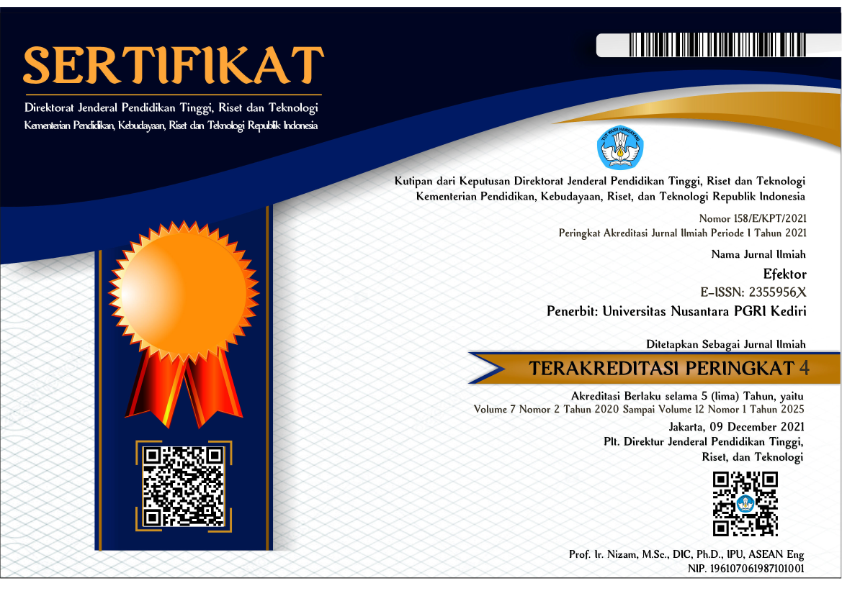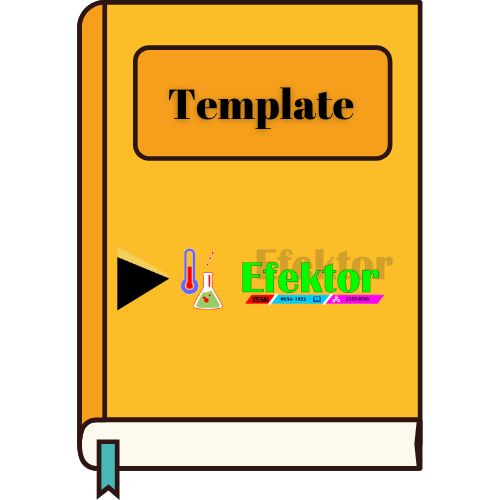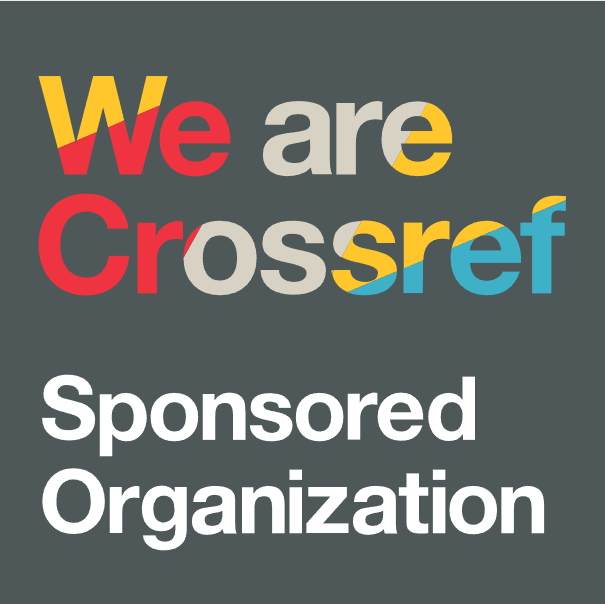Peningkatan Hasil Belajar Fisika Dengan Metode Pembelajaran Brainstorming
DOI:
https://doi.org/10.29407/e.v7i2.14944Keywords:
Brainstorming, Hasil Belajar, Fisika, Learning Outcome, physicsAbstract
Classroom Action research is against the background of the lack of activeness of the students, especially class X TKRO 01 SMK Negeri 1 Trenggalek school year 2018/2019 in the scientific attitude and mastery learning classical low. Based on the acquisition of the data, the percentage of student activity 42,86 %. Because it then affects the learning outcomes of students who tend to be low around 54,29 % of the expected result or the limit of the minimum standard of completeness. It is based on obtaining the results of the study on previous material. This research method used the research model to adapt the combined Sanford and Kemmis using classroom action research. The study was conducted in two cycles: one cycle is performed as much as two times the action research. The subject of research is class X TKRO 01 as many as 35 students. Data collection techniques in this research using observation and test. Data in the form of learning outcomes in the form of assessment of the third aspect, among others, attitude, skills, knowledge with the use of instruments as appropriate. The results of the test in cycle I based on the data acquisition of the percentage of mastery learning classical reached 74,29 % with the average results of the acquisition value 71,81. The percentage of mastery the standards mastery minimum in the classical style. While for the assessment of the activity, the percentage of active students in scientific attitude to achieve 71,43 % with the number of students active in 25 of the 35 students. Assessment of skills to achieve the percentage of 71,43 % with the average value of the skills of 63,81. The results of the test in cycle II data based on the acquisition of the percentage of mastery learning classical reached 85,71 % with the average results of the acquisition value 76,00. While for the assessment of the activity, the percentage of active students in scientific attitude reached 85,71 % with the number of students active 30 of 35 students and assessment of skills to achieve the percentage of 82,86 % with the average value of the skills of 77,14. Based on the acquisition of a percentage of the value of the learning result from cycle I and cycle II increased by 11,42 % to the value of knowledge, while the liveliness of the students in the scientific attitude increased by 11,43 %, while the skills of students increased by 14,28 %, so learning the methods of brainstorming can improve student learning outcomes.
References
Aan Ardian, Riswan Dwi Djatmiko. 2008. Penerapan Model Pembelajaran Brainstorming untuk Meningkatkan Kreativitas Mahasiswa pada Mata Kuliah Praktik Fabrikasi. Jurnal Pendidikan Teknologi dan Kejuruan Vol 17 No 01 (2008): 61-76.
Abdul Karim. 2017. Penerapan Metode Brainstorming pada Mata Pelajaran IPS untuk Meningkatkan Hasil Belajar Kelas VII di SMPN 4 Rumbio Jaya. Jurnal Pendidikan Ekonomi Akuntansi FKIP UIR Vol 5 No 1 (2017):1-12.
Antuni Wiyarsih dan Sutiman. 2009. Pengaruh Peta Konsep terhadap Motivasi dan Penguasaan Konsep Kimia Siswa SMA. Jurnal Pendidikan Matematika dan Sains edisi II (2009): 81-88.
Asril. 2018. Penerapan Strategi Belajar Peta Konsep (Concept Mapping) untuk Meningkatkan Hasil Belajar PKN Siswa Kelas IV Sekolah Dasar. Jurnal Primary Program Studi Pendidikan Guru Sekolah Dasar Fakultas Keguruan dan Ilmu Pendidikan Universitas Riau Vol 7 Nomor 1 (April 2018): 112-121.
Arikunto, Suharsimi. 2019. Penelitian Tindakan Kelas, Jakarta: Bumi Aksara.
Diyah Nur Fauziyyah Amin. 2016. Penerapan Metode Curah Gagasan (Brainstorming) Untuk Meningkatkan Kemampuan Mengemukakan Pendapat Siswa. Jurnal PENDIDIKAN SEJARAH Vol.5 No.2 (Juli 2016): 1-15.
Evi Lestari Purba. 2017. Penerapan Metode Brainstorming dalam Pembuatan Iklan tentang Bahaya Narkoba. Majalah Ilmiah INTI Vol XII, No 1 (Januari 2017): 26-32.
Fauzatul Ma’rufah Rohmanurmeta, Arni Gemilang Harsanti dan Heny Kusuma Widyaningrum.Pengaruh Metode Brainstorming terhadap Motivasi dan Hasil Belajar pada Pembelajaran Tematik Integratif. Jurnal Dimensi Pendidikan dan Pembelajaran Vol.4No.2 (Juli 2016) :10-20.
Hamalik, Oemar. 2006. Proses Belajar Mengajar. Bandung: Bumi Aksara.
Ibnu, Trianto. 2017. Mendesain Model Pembelajaran Inovatif, Progresif, dan Kontekstual. Jakarta: Kencana.
Ika Eryanti. 2015. Pengaruh Strategi Belajar Peta Konsep terhadap Ketuntasan Belajar Matematika Siswa. Jurnal Pendidikan Matematika dan Matematika Vol 1, No 2 (Desember 2015): 45-58.
Maulidyana, Ulhaq Zuhdi. 2018. Pengaruh Metode Brainstorming terhadap Keterampilan Pemecahan Masalah pada Muatan Materi IPS Tema 8 Lingkungan Sahabat Kita SDN Gempol 3 Pasuruan. JPGSD Volume 06 Nomor 02 Tahun 2018, 177-186.
Nyoman Tri Wardani. 2016. Penerapan Metode Brainstorming dalam Rangka Peningkatan Aktivitas dan Hasil Belajar pada Mata Pelajaran Ekonomi siswa Kelas XI IPS 1 SMA Negeri 1 Sukasada Tahun Ajaran 2016/2017. Jurnal Program Studi Pendidikan Ekonomi Vol 8 No. 3 (2016): 1-10.
Palil, Nafik. 2018. Sekolah tanpa PR 4 Model Pembelajaran. Surabaya: Madril Pustaka Production.
Robertus Febrima Yulianto, Syaiful M, Muhammad Basri. 2019. Pengaruh Penerapan Metode Pembelajaran Brainstorming terhadap Hasil Belajar Sejarah Siswa Kelas X-1. Jurnal Pendidikan dan Penelitian Sejarah Vol 07 No. 01 (2019): 1-12.
Swardana, Doni. 2013. Penerapan Mind Mapping dalam Kurikulum Pembelajaran. Jakarta: Elex Media Komputindo.
Taniredja, Dkk. 2010. Penelitian Tindakan Kelas. Bandung: Alfabeta.
Wartono. 2003. Pengembangan Program Pengajaran Fisika. Malang: JICA.
Downloads
Published
Issue
Section
License
Authors who publish with this journal agree to the following terms:
- Copyright on any article is retained by the author(s).
- The author grants the journal, the right of first publication with the work simultaneously licensed under a Creative Commons Attribution License that allows others to share the work with an acknowledgment of the work’s authorship and initial publication in this journal.
- Authors are able to enter into separate, additional contractual arrangements for the non-exclusive distribution of the journal’s published version of the work (e.g., post it to an institutional repository or publish it in a book), with an acknowledgment of its initial publication in this journal.
- Authors are permitted and encouraged to post their work online (e.g., in institutional repositories or on their website) prior to and during the submission process, as it can lead to productive exchanges, as well as earlier and greater citation of published work.
- The article and any associated published material is distributed under the Creative Commons Attribution-ShareAlike 4.0 International License













